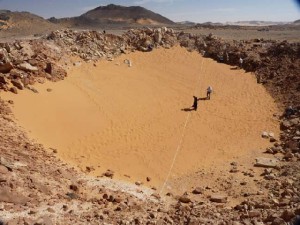A new recycling program in the United Arab Emirates makes recycling easy, and potentially profitable for the country’s top brands.
At one time aluminum (used in pavement signs, advertising boards) was more valuable than gold according to Averda – an environmental services company, that has recently launched an ingenius recycling program in the United Arab Emirates.
Not unlike the reverse vending machines (RVM) in Lebanon supported by Nestle and other big businesses (not on Greenpeace’s list of favorite corporations), RVMs will make recycling cans and plastic bottles ridiculously easy for Emiratis and expatriates.
And that’s a good thing since convenience is widely considered key to the successful rollout of any recycling program. But Averda – informed by four decades of waste management and in-house research and development – has reached even further into the psyche of Emirate consumer culture by turning recycling into a golden advertising opportunity for the country’s big brands.
that’s great, here is the link:
How does it work:
They look like regular vending machines except that RVMs placed at shopping malls, schools, universities, sports venues, supermarkets and private communities throughout the Emirates will gobble up already used cans and bottles and then spit out rewards. These rewards earn consumers/recyclers points that can be redeemed at participating retailers.
Herein lies the genius: businesses eager for a highly visual advertising opportunity can sponsor machines and offer rewards. In so doing, they appear to support recycling initiatives, which – in a closed loop system – encourages more recycling by consumers.
The vending machines speak to the need to provide incentives to recycle, and certainly make it easy enough. Whether or not the average Emirati consumer “needs” points to go to their favorite store is uncertain, although there are plenty of expatriates who will be more than happy to receive points towards what might usually be elusive top brand goods.
What makes people recycle:
Open University research shows that in addition to making recycling easy (most people in the UK argued in favor of a single curb-side bin that is collected by waste management companies), it is important to provide information.
Details showing why recycling is necessary, and what happens to the goods once they have been collected from the RVM’s belly should accompany the vending machines. Empowering citizens with knowledge in addition to financial rewards will make it more likely that a visit to the local RVM becomes as much a part of daily behavior as teeth-brushing.
RVM technology provided by Tomra will also appear in locations throughout Saudi Arabia by the end of the year, and in Oman and Qatar by the end of next. Our dreams for a cleaner Gulf appear more in reach than ever before!
:: Trade Arabia
More on recycling in the Middle East:
Artiquea: The Beautiful Art of Recycling Glass
Big Business Sponsors Recycling Vending Machines in Lebanon
Recycling Tires can Rid Egypt of Fumes, Mosquitoes, and Rats





Finns keen on recycling on cans and bottles
The system of deposits paid on returned packages has proven to be very successful in Finland. In 2010 the Finnish people returned 98 percent of the bottles and cans belonging to the system.
– From an international viewpoint, the Finnish deposit system on packages is top of the world. While the Finnish people recycle over 90 percent of all aluminium cans, in West Europe the average is mere 60 percent. Other Nordic countries have a similarly functional recycling system for their bottles and cans. However, the further south in Europe, the smaller the recycling percentages.
– In other parts of the world bottles and cans aren’t recycled as efficiently. In the United States a deposit system for beverage packages is in its place only on the east and west coasts.
From the beginning of 2008 disposable bottles, which are re-useable as raw material, were declared as tax free. This has introduced a whole new wave of single-use bottles, which are made of PET-plastic. These disposable bottles are re-used in making new plastic bottles as well as being turned into packaging material for the food industry.
Why the interest? High returns on deposits? In Israel, people just toss their recyclables in the garbage.